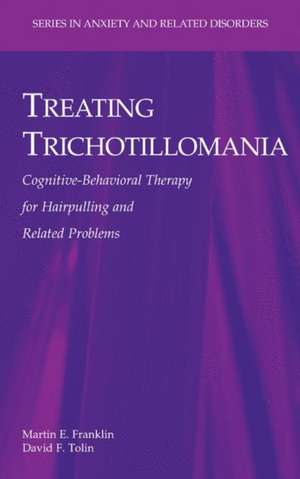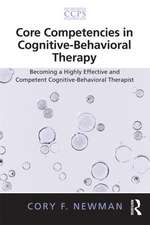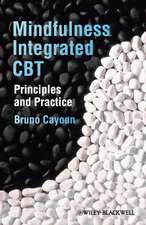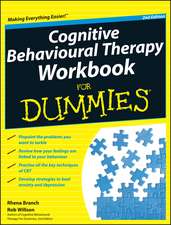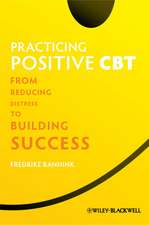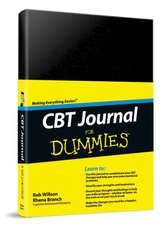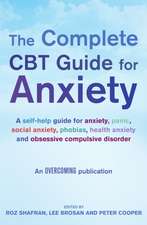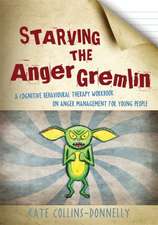Treating Trichotillomania: Cognitive-Behavioral Therapy for Hairpulling and Related Problems: Series in Anxiety and Related Disorders
Autor Martin E. Franklin, David F. Tolinen Limba Engleză Hardback – 27 sep 2007
| Toate formatele și edițiile | Preț | Express |
|---|---|---|
| Paperback (1) | 585.90 lei 6-8 săpt. | |
| Springer – 23 noi 2010 | 585.90 lei 6-8 săpt. | |
| Hardback (1) | 775.86 lei 6-8 săpt. | |
| Springer – 27 sep 2007 | 775.86 lei 6-8 săpt. |
Preț: 775.86 lei
Preț vechi: 816.69 lei
-5% Nou
Puncte Express: 1164
Preț estimativ în valută:
148.48€ • 154.44$ • 122.58£
148.48€ • 154.44$ • 122.58£
Carte tipărită la comandă
Livrare economică 14-28 aprilie
Preluare comenzi: 021 569.72.76
Specificații
ISBN-13: 9780387708829
ISBN-10: 0387708820
Pagini: 210
Ilustrații: XIV, 210 p.
Dimensiuni: 156 x 235 x 14 mm
Greutate: 0.5 kg
Ediția:2007
Editura: Springer
Colecția Springer
Seria Series in Anxiety and Related Disorders
Locul publicării:New York, NY, United States
ISBN-10: 0387708820
Pagini: 210
Ilustrații: XIV, 210 p.
Dimensiuni: 156 x 235 x 14 mm
Greutate: 0.5 kg
Ediția:2007
Editura: Springer
Colecția Springer
Seria Series in Anxiety and Related Disorders
Locul publicării:New York, NY, United States
Public țintă
Professional/practitionerCuprins
I. Overview and Assessment.- Trichotillo-What? Definition, Epidemiology, Impairment.- Putting it Together: Biopsychosocial Theory of TTM.- What it is and what it isn't: Diagnostics, Differential Diagnosis, Measures.- Doing the Detective Work: Comprehensive Assessment/Functional Analysis.- What Should be Done? Presentation of Treatment Alternatives (Including CBT).- What do We Need to Know? Frequently and Infrequently Asked Questions.- II. Treatment: Core Elements.- You Can't Fight What You Can't See: Awareness Training and Self-Monitoring.- Speed Bumps: Stimulus Control.- Active Strategies for Active Hands: Habit Reversal/Competing Response.-Holding the Lead: Maintenance.- III. Treatment: Adjunctive Modules.-Introduction to Section: What are these for? How do You Know if You Need Them?.- I’m not Sure if I’m Ready: Module 1: Motivational Enhancement.- Calming Down: Module 2: Relaxation/Deep Breathing.- Changing Your Thinking: Module 3: Cognitive Restructuring.- When other Problems are also Present: Module 4: Clinical Management of Comorbidity.- Attending to the Context: Module 5: Family Assessment and Family-Based Interventions.- Getting Support: Module 6: Group Based Interventions .- IV. Resources for Clinicians, Patients, and Families.- Comprehensive List of Professional and Informational Sources for Clinicians, Patients and Families.- Literature Cited.
Recenzii
From the reviews:
"Treating Trichotillomania: Cognitive-Behavioral Therapy of Hairpulling and Related Problems focuses primarily on trichotillomania (TTM) … . it is concise, well written, empirically grounded, and richly filled with clinical examples and samples of patient-therapist dialogue that clearly illustrate the various techniques. … In summary, this book is essential reading for all clinicians involved in the treatment of TTM. … Franklin and Tolin have performed a valuable clinical service by clearly showing readers how to implement this intervention along with other cognitive-behavioral interventions for TTM." (Steven Taylor, PsycCRITIQUES, Vol. 53 (11), 2008)
"This book on treating trichotillomania is a powerful addition to a continuing series on anxiety and related disorders. … Psychologists and other mental health professionals will find this valuable for their practice. Graduate students will benefit from the advanced knowledge and overall understanding of trichotillomania. … One major highlight is the emphasis on self-monitoring which is important for all psychiatric disorders. This is one of the best books available on trichotillomania, and clinicians are strongly urged to have this invaluable reference on their selves." (Nicholas Greco IV, Doody’s Review Service, August, 2009)
"Treating Trichotillomania: Cognitive-Behavioral Therapy of Hairpulling and Related Problems focuses primarily on trichotillomania (TTM) … . it is concise, well written, empirically grounded, and richly filled with clinical examples and samples of patient-therapist dialogue that clearly illustrate the various techniques. … In summary, this book is essential reading for all clinicians involved in the treatment of TTM. … Franklin and Tolin have performed a valuable clinical service by clearly showing readers how to implement this intervention along with other cognitive-behavioral interventions for TTM." (Steven Taylor, PsycCRITIQUES, Vol. 53 (11), 2008)
"This book on treating trichotillomania is a powerful addition to a continuing series on anxiety and related disorders. … Psychologists and other mental health professionals will find this valuable for their practice. Graduate students will benefit from the advanced knowledge and overall understanding of trichotillomania. … One major highlight is the emphasis on self-monitoring which is important for all psychiatric disorders. This is one of the best books available on trichotillomania, and clinicians are strongly urged to have this invaluable reference on their selves." (Nicholas Greco IV, Doody’s Review Service, August, 2009)
Notă biografică
Martin E. Franklin, Ph.D., Associate Professor of Clinical Psychology in Psychiatry and Clinical Director of the Center for the Treatment and Study of Anxiety at the University of Pennsylvania School of Medicine, received his Ph.D. in clinical psychology from the University of Rhode Island in 1993. Dr. Franklin joined the Center's faculty in 1992 upon completion of his clinical internship at the Medical College of Pennsylvania/Eastern Pennsylvania Psychiatric Institute. His scholarly publications include scientific articles and book chapters on the treatment of adult and pediatric OCD, social phobia, trichotillomania, PTSD, and readiness for behavior change. He was a member of the Expert Consensus Panel for Obsessive Compulsive Disorder that assisted with the development of treatment guidelines for adult and pediatric OCD. Dr. Franklin is a co-investigator and clinical supervisor on the Center's ongoing NIMH-funded randomized controlled trials in pediatric OCD, adult OCD, and social phobia.
David F. Tolin, Ph.D., is the founder and Director of the Anxiety Disorders Center at The Institute of Living. He is also Assistant Professor of Psychiatry at the University of Connecticut School of Medicine. Dr. Tolin received his Ph.D. from the University of Arkansas, and completed a predoctoral internship at Tufts University School of Medicine/VA Medical Center, Boston. Dr. Tolin's research and clinical interests include cognitive-behavioral therapy for anxiety disorders in adults and children, and cognitive processes that underlie anxiety disorders, particularly obsessive-compulsive disorder, posttraumatic stress disorder, and panic disorder. He is the recipient of the award for Distinguished Contribution to the Science of Psychology from the Connecticut Psychological Association, and an Early Career Award from the Anxiety Disorders Special Interest Group of the Association for Advancement of Behavior Therapy. He is a Fellow of the Council for Scientific Medicine and Mental Health.
Dr. Tolin is the author of over 90 journal articles and book chapters, and over 140 research presentations to national and international organizations. Dr. Tolin is principal investigator on the National Institute of Mental Health (NIMH)-funded studies "Stepped Care for Obsessive-Compulsive Disorder" and "Neural Mechanisms of Compulsive Hoarding," and co-investigator on the NIMH-funded studies "Psychopathology of Compulsive Hoarding" (principal investigator: R. Frost), "Treatment of Compulsive Hoarding" (principal investigator: G. Steketee), and "Screening for GAD among Frail Elderly" (principal investigator: G. Diefenbach). He has served as principal investigator on several industry-sponsored clinical trials of experimental medications. Dr. Tolin has been interviewed for The New York Times and the Associated Press, and has been a recurrent guest on The Today Show, Good Morning America and The Oprah Winfrey Show.
David F. Tolin, Ph.D., is the founder and Director of the Anxiety Disorders Center at The Institute of Living. He is also Assistant Professor of Psychiatry at the University of Connecticut School of Medicine. Dr. Tolin received his Ph.D. from the University of Arkansas, and completed a predoctoral internship at Tufts University School of Medicine/VA Medical Center, Boston. Dr. Tolin's research and clinical interests include cognitive-behavioral therapy for anxiety disorders in adults and children, and cognitive processes that underlie anxiety disorders, particularly obsessive-compulsive disorder, posttraumatic stress disorder, and panic disorder. He is the recipient of the award for Distinguished Contribution to the Science of Psychology from the Connecticut Psychological Association, and an Early Career Award from the Anxiety Disorders Special Interest Group of the Association for Advancement of Behavior Therapy. He is a Fellow of the Council for Scientific Medicine and Mental Health.
Dr. Tolin is the author of over 90 journal articles and book chapters, and over 140 research presentations to national and international organizations. Dr. Tolin is principal investigator on the National Institute of Mental Health (NIMH)-funded studies "Stepped Care for Obsessive-Compulsive Disorder" and "Neural Mechanisms of Compulsive Hoarding," and co-investigator on the NIMH-funded studies "Psychopathology of Compulsive Hoarding" (principal investigator: R. Frost), "Treatment of Compulsive Hoarding" (principal investigator: G. Steketee), and "Screening for GAD among Frail Elderly" (principal investigator: G. Diefenbach). He has served as principal investigator on several industry-sponsored clinical trials of experimental medications. Dr. Tolin has been interviewed for The New York Times and the Associated Press, and has been a recurrent guest on The Today Show, Good Morning America and The Oprah Winfrey Show.
Textul de pe ultima copertă
Trichotillomania has been described in the literature for at least a hundred years, but has only in the past decade received serious clinical attention. Although now a "higher profile" disorder, there is still scant clinical information on trichotillomania. A full-length cognitive-behavioral treatment manual, Treating Trichotillomania (TTM) fills that need. Designing the book for maximum usefulness, authors Franklin and Tolin share their considerable expertise in treating body-focused repetitive behavior disorders (not only hair-pulling but skin-picking and nail-biting as well) in an accessible, clinically valid reference.
Treating Trichotillomania carefully defines TTM, differentiating the disorder from other conditions such as OCD, reviewing the varied clinical forms it can take, and setting out its diagnostic criteria. Treatment chapters are not one-size-fits-all, but offer an evidence-based framework to help practitioners in designing the most appropriate course of treatment across the developmental spectrum, from toddlers to elders. The authors give the reader:
Treating Trichotillomania carefully defines TTM, differentiating the disorder from other conditions such as OCD, reviewing the varied clinical forms it can take, and setting out its diagnostic criteria. Treatment chapters are not one-size-fits-all, but offer an evidence-based framework to help practitioners in designing the most appropriate course of treatment across the developmental spectrum, from toddlers to elders. The authors give the reader:
- Comprehensive discussion of assessment and treatment methods.
- Key elements of treatment, including awareness training, habit reversal, and maintenance techniques.
- Helpful ideas for treating clients with other disorders in addition to TTM.
- "What Do We Need to Know?" chapter, addressing clients’ and families’ frequently asked questions.
- Adjunctive cognitive-behavioral strategies, including family and group interventions.
- Resources for clinicians, clients, and families.
Caracteristici
Includes assessment measures and analysis, as well as core elements of treatment Special chapter on frequently asked questions about body-focused impulse control disorders and CBT Describes the nature of these disorders, distinguishing them from the OCD spectrum of disorders The first comprehensive, clinical, and empirically-based volume to address these disorders Relevant to both child and adult clinicians and researchers
